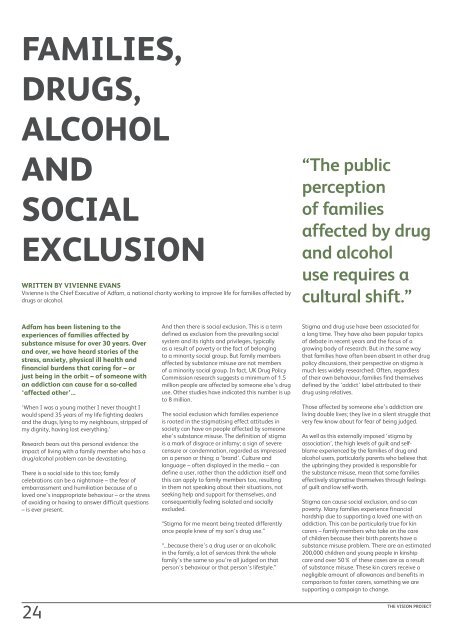The Vision Project
Throughout 2019, Developing Health & Independence (DHI), have been marking their 20th anniversary as a charity by looking to the future. Through articles, events and podcasts, they've asked people to answer the question of how we can achieve their vision of ending social exclusion. This collection of articles includes the contributions of experts from across public life and the political spectrum.
Throughout 2019, Developing Health & Independence (DHI), have been marking their 20th anniversary as a charity by looking to the future. Through articles, events and podcasts, they've asked people to answer the question of how we can achieve their vision of ending social exclusion. This collection of articles includes the contributions of experts from across public life and the political spectrum.
Create successful ePaper yourself
Turn your PDF publications into a flip-book with our unique Google optimized e-Paper software.
FAMILIES,<br />
DRUGS,<br />
ALCOHOL<br />
AND<br />
SOCIAL<br />
EXCLUSION<br />
WRITTEN BY VIVIENNE EVANS<br />
Vivienne is the Chief Executive of Adfam, a national charity working to improve life for families affected by<br />
drugs or alcohol.<br />
“<strong>The</strong> public<br />
perception<br />
of families<br />
affected by drug<br />
and alcohol<br />
use requires a<br />
cultural shift.”<br />
Adfam has been listening to the<br />
experiences of families affected by<br />
substance misuse for over 30 years. Over<br />
and over, we have heard stories of the<br />
stress, anxiety, physical ill health and<br />
financial burdens that caring for – or<br />
just being in the orbit – of someone with<br />
an addiction can cause for a so-called<br />
‘affected other’...<br />
‘When I was a young mother I never thought I<br />
would spend 35 years of my life fighting dealers<br />
and the drugs, lying to my neighbours, stripped of<br />
my dignity, having lost everything.’<br />
Research bears out this personal evidence: the<br />
impact of living with a family member who has a<br />
drug/alcohol problem can be devastating.<br />
<strong>The</strong>re is a social side to this too; family<br />
celebrations can be a nightmare – the fear of<br />
embarrassment and humiliation because of a<br />
loved one’s inappropriate behaviour – or the stress<br />
of avoiding or having to answer difficult questions<br />
– is ever present.<br />
24<br />
And then there is social exclusion. This is a term<br />
defined as exclusion from the prevailing social<br />
system and its rights and privileges, typically<br />
as a result of poverty or the fact of belonging<br />
to a minority social group. But family members<br />
affected by substance misuse are not members<br />
of a minority social group. In fact, UK Drug Policy<br />
Commission research suggests a minimum of 1.5<br />
million people are affected by someone else’s drug<br />
use. Other studies have indicated this number is up<br />
to 8 million.<br />
<strong>The</strong> social exclusion which families experience<br />
is rooted in the stigmatising effect attitudes in<br />
society can have on people affected by someone<br />
else’s substance misuse. <strong>The</strong> definition of stigma<br />
is a mark of disgrace or infamy; a sign of severe<br />
censure or condemnation, regarded as impressed<br />
on a person or thing; a ‘brand’. Culture and<br />
language – often displayed in the media – can<br />
define a user, rather than the addiction itself and<br />
this can apply to family members too, resulting<br />
in them not speaking about their situations, not<br />
seeking help and support for themselves, and<br />
consequentially feeling isolated and socially<br />
excluded.<br />
“Stigma for me meant being treated differently<br />
once people knew of my son’s drug use.”<br />
“...because there’s a drug user or an alcoholic<br />
in the family, a lot of services think the whole<br />
family’s the same so you’re all judged on that<br />
person’s behaviour or that person’s lifestyle.”<br />
Stigma and drug use have been associated for<br />
a long time. <strong>The</strong>y have also been popular topics<br />
of debate in recent years and the focus of a<br />
growing body of research. But in the same way<br />
that families have often been absent in other drug<br />
policy discussions, their perspective on stigma is<br />
much less widely researched. Often, regardless<br />
of their own behaviour, families find themselves<br />
defined by the ‘addict’ label attributed to their<br />
drug using relatives.<br />
Those affected by someone else’s addiction are<br />
living double lives; they live in a silent struggle that<br />
very few know about for fear of being judged.<br />
As well as this externally imposed ‘stigma by<br />
association’, the high levels of guilt and selfblame<br />
experienced by the families of drug and<br />
alcohol users, particularly parents who believe that<br />
the upbringing they provided is responsible for<br />
the substance misuse, mean that some families<br />
effectively stigmatise themselves through feelings<br />
of guilt and low self-worth.<br />
Stigma can cause social exclusion, and so can<br />
poverty. Many families experience financial<br />
hardship due to supporting a loved one with an<br />
addiction. This can be particularly true for kin<br />
carers – family members who take on the care<br />
of children because their birth parents have a<br />
substance misuse problem. <strong>The</strong>re are an estimated<br />
200,000 children and young people in kinship<br />
care and over 50% of these cases are as a result<br />
of substance misuse. <strong>The</strong>se kin carers receive a<br />
negligible amount of allowances and benefits in<br />
comparison to foster carers, something we are<br />
supporting a campaign to change.<br />
THE VISION PROJECT




